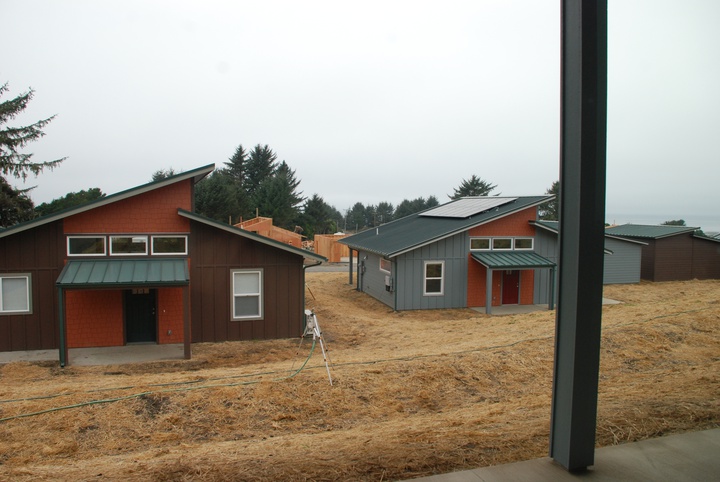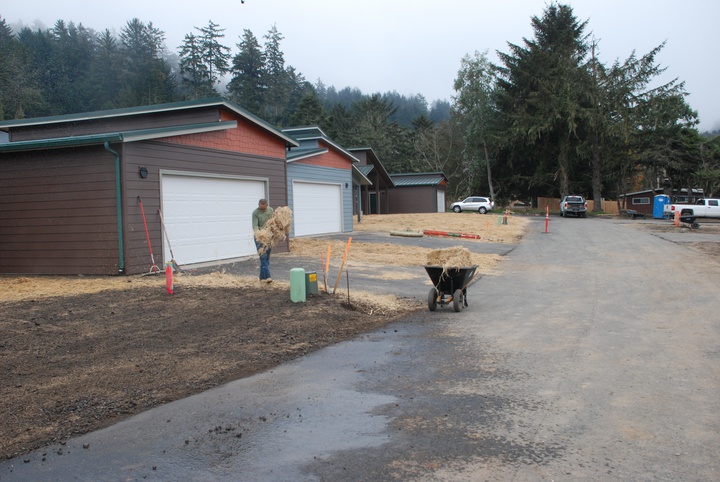Jessica Cejnar / Thursday, Oct. 17, 2019 @ 7:05 a.m. / Community, Tribes
'I just wanted to be here'; Families Move Into Tolowa Dee-ni' Nation's New Dat-naa-svt Village

A view of Dat-naa-svt, the Tolowa Dee-ni' Nation's new low-income housing village, from one of the homes. Photo: Jessica Cejnar
Between Tidewater cement trucks bringing in concrete and construction crews putting up walls and roofs, Lindsay Hall’s village is still a work in progress.
But to be home is a dream come true, she says.
“I just wanted to be here,” Hall said. “I’m a Smith River girl.”
Hall moved into the Tolowa Dee-ni’ Nation’s new Dat-naa-svt housing project last weekend with her three youngsters, 8-year-old Kayden, 5-year-old Diane and 11-month-old Angela. On a misty Tuesday morning, as workers with Ritchie Construction poured new foundations and put down sod, she walked her new neighborhood with a broom, sweeping up stray bits of straw.
Hall’s family is one of 10 that have moved into the tribe’s new low-income housing village since it began taking tenants in July. Offering 2-bedroom, 3-bedroom and 4-bedroom houses, the tribe expects to offer homes to six more families by next February, Planning Director Tim Hoone told the Wild Rivers Outpost.
The last five homes will be completed by May 2020, Hoone said. A community center, the final piece, is expected to be finished by August 2020, he said.
“We broke ground in October 2018,” Hoone told WRO. “We started building walls on the first houses in January 2019. By July 2019, six homes were completed and families moved in. This month we had four more homes completed and four more families moving in.”
Dat-naa-svt Village — Tolowa for North Beach — sits on approximately 12 acres of a 25-acre parcel that was in trust for the tribe, Hoone said. Modeled after traditional native homes with their sloped roofs and concrete doorways standing in for concrete entries, the houses sit on a terraced slope between Ocean View Drive and U.S. 101 just north of Lopez Creek facing the Pacific.
Creating affordable housing for its citizens has long been one of the Tolowa Dee-ni’ Nation’s goals, Hoone said. In 2011, the tribe completed six units of elder housing on South Indian Road in Smith River. In 2015, the Tolowa Dee-ni’ Nation built affordable housing in Brookings.
After completing a housing needs assessment in 2016, the tribe realized it had 25 acres of land in trust with existing water and sewer infrastructure, Hoone said. The tribe had also already constructed two homes on that parcel in 2011.

A worker prepares a home's front yard for fresh sod at the Tolowa Dee-ni' Nation's new low-income housing village. Photo: Jessica Cejnar
The Tolowa Dee-ni’ Nation held public meetings and determined that it wanted to build homes that met the needs of its citizens and reflected Tolowa values — a modern Tolowa village, Hoone said. In addition to preserving the ocean view, the tribe also wanted to include a gathering space for workshops, after school classes and daily services.
Once tribal officials had selected the design for their village, they applied to the State of California for housing tax credits in 2018, Hoone said. By June, they learned they were awarded $1 million a year in tax credits for 10 years, he said.
Investors contributed $8.9 million to build Dat-naa-svt, Hoone said, while the tribe put in $4 million. The total project cost is $12.9 million, he said.
“The tax credits generate investor dollars,” Hoone said. “But those dollars come with strings. Housing is limited to households who have 60 percent of the median income or less.”
In Del Norte County, a family of four with an income of $38,000 a year would be eligible for low-income housing, Hoone said. Potential tenants are assessed based on their level of need, including family size and the length of time they’ve been on a waiting list for housing. Though the main requirement is their level of income, possible tenants get additional points for being an elder or being disabled, Hoone said.
Wanting to be energy efficient, the tribe also installed solar panels on the homes’ south-facing sloped roofs. This reduces tenants’ electric bills to a net zero, Hoone said. The water heaters use one-quarter of the electricity than conventional heaters.
Once all the homes have been built, Hoone said the tribe will create an edible landscape with blueberries and raspberries. There will be room for people to keep gardens, he said.
“It’s fair to say this is the largest subdivision to be completed in Del Norte County in the last 10-15 years,” Hoone said.
Since the tribe is the project’s general contractor, Dat-naa-svt has also created jobs for more than 19 tribal citizens, Hoone said. The subcontractors have also been local to Del Norte and Curry counties, he said.
At the construction site, Mark Ritchie, of Brookings-based Ritchie Construction, said many of the men working for him are excited to be receiving a paycheck. They’re even more excited to see the families move in, he said.
“They get to hear stories and see the successes,” Ritchie said. “They’re just ecstatic.”
For Hall, who moved from Crescent City, living at Dat-aa-svt means being close to her mother and being able to help her elders.
“I hope to make a name for myself and stay within the tribe,” she said. “Being a village — it’s a whole. It’s an entirety.”
CLICK TO MANAGE